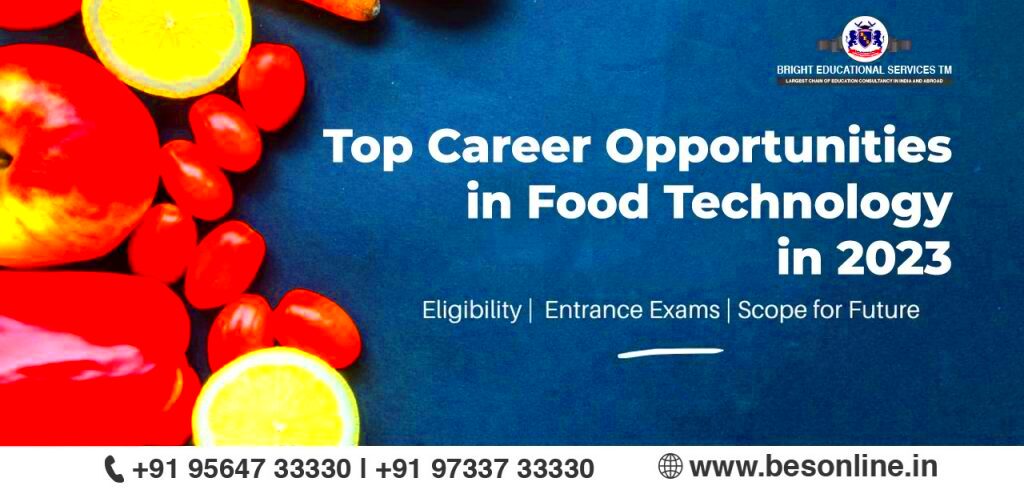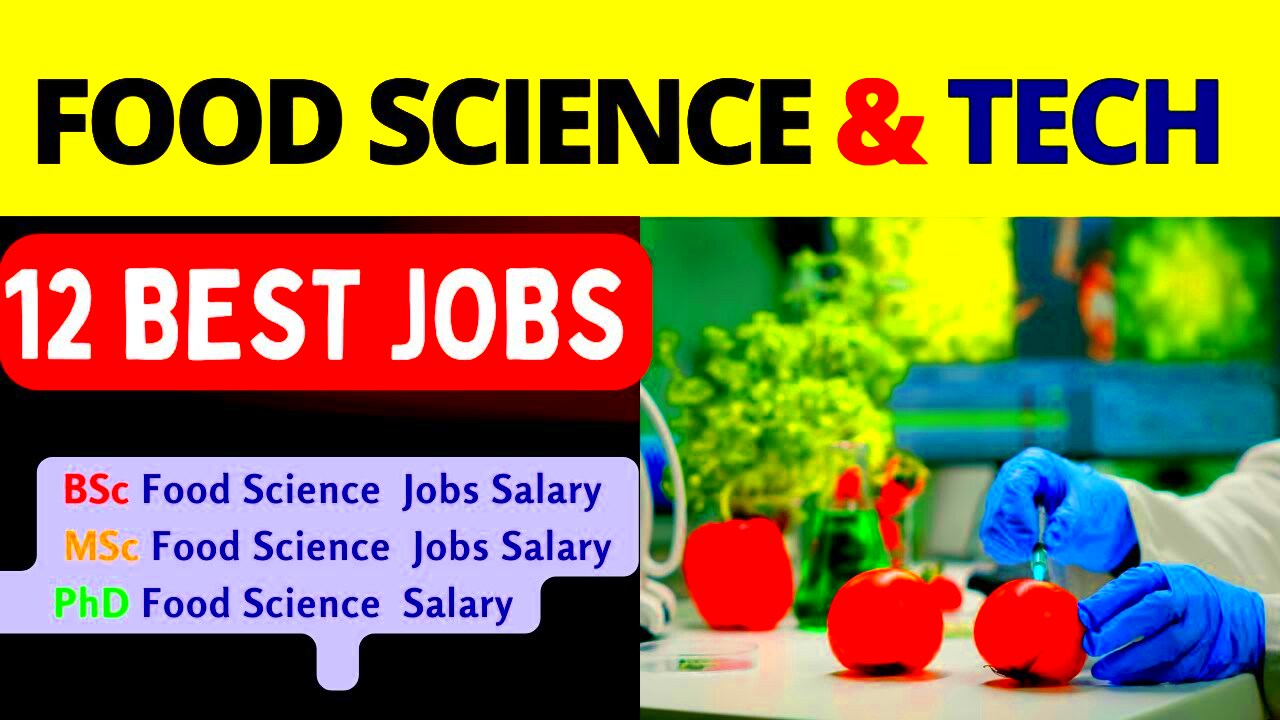The domain of food tech includes science, engineering, and culinary arts. It evolves around the need for improving food production, safety and quality. The increasing demand for healthier and sustainable food options has opened up job opportunities in this field. If you’re interested in research, quality control or product development, the chances are that there is a suitable position for you.Now let’s explore the educational directions and categories of jobs found in food
technology.
Educational Paths in Food Technology

In order to pursue a profession in the food industry one has to build a solid base regarding education. Here are some of the frequently chosen routes:
- Bachelor’s Degree: A four-year degree in food science, nutrition, or related fields is essential for most entry-level positions. Coursework often includes chemistry, microbiology, and food safety.
- Master’s Degree: For those looking to advance their careers or specialize, a master's degree can provide in-depth knowledge and research opportunities.
- Certifications: Additional certifications, such as those offered by the Institute of Food Technologists (IFT), can enhance your credentials and job prospects.
During your studies, the importance of internships and practical experience cannot be overstated. They allow for applying theoretical knowledge obtained in class to actual contexts while creating important networks within the industry.
Types of Jobs in Food Technology
A plethora of job options exist within the realm of food
technology. What follows is an enumeration of certain typical occupations:
| Job Title | Description |
|---|
| Food Scientist | Conducts research to develop new food products and improve existing ones. |
| Quality Assurance Specialist | Ensures that food products meet safety and quality standards. |
| Food Safety Manager | Oversees food safety practices within a company to prevent contamination and ensure compliance with regulations. |
| Product Development Manager | Leads the creation and testing of new food products from concept to market. |
| Food Technologist | Works on improving food processing and packaging techniques to enhance product quality. |
Every task described above has an important part to play in making sure that the food we take is safe, nutritious and tasteful. Finding a satisfying job opportunity in this vibrant industry is possible if you have the right knowledge and talent.
Skills Needed for a Successful Career
Technical plus soft skills are important for excellence in food
technology. The following are important skills for success:
- Analytical Skills: You’ll need to analyze data, conduct experiments, and interpret results. This is vital for roles in quality assurance and product development.
- Attention to Detail: In food technology, even the smallest mistake can lead to safety issues. A keen eye for detail helps ensure accuracy in testing and compliance.
- Problem-Solving Abilities: You’ll often encounter challenges, whether in production processes or product formulations. Strong problem-solving skills allow you to find effective solutions quickly.
- Communication Skills: Clear communication is crucial. You’ll collaborate with team members, present findings, and sometimes interact with consumers.
- Teamwork: Many projects require teamwork, so being able to work well with others is key to a successful career.
Likewise, it is imperative to stay current with the industry’s trends and technological advancements. For instance, visiting some conferences or taking part in workshops can help hone your abilities.
Top Employers in the Food Technology Industry
There are many kinds of employers in the food
technology sector, including both small start-ups and big multinational companies. Some top organisations that employ food technologists include:
| Company Name | Industry Focus |
|---|
| General Mills | Food products, cereals, snacks |
| Kraft Heinz | Packaged food, condiments |
| PepsiCo | Beverages and snack foods |
| Nestlé | Nutrition, health, and wellness products |
| Cargill | Agriculture, food ingredients |
In addition to providing jobs for their workers, these companies are often at the forefront of innovation and sustainability practices in food
technology. If you become part of such an institution, it can be a great opportunity to gain experience and progress your career.
Work Environment and Culture
Depending on the specific job you do and who employs you, your work environment in food technology may differ greatly. However, these are some of the characteristic features:
- Laboratory and Office Settings: Many food technologists work in labs, where they conduct experiments and analyze samples. Others may work in office settings, focusing on research or project management.
- Collaboration: Teamwork is a big part of the culture in food technology. You'll often work with other scientists, engineers, and marketing professionals to develop products and solve problems.
- Innovation-Driven: The industry thrives on innovation. Companies encourage creative thinking and new ideas to improve products and processes.
- Health and Safety Focus: Given the nature of the industry, there’s a strong emphasis on safety and compliance with regulations. This creates a culture of responsibility and diligence.
Broadly speaking, food technology can be an exciting and lucrative profession. In an important sector that impacts on the day to day lives of every person, you will add your voice through teamwork, science, and creativity.
Future Trends in Food Technology Careers
In order to maintain a competitive advantage in your profession, you must be aware that this arena is always changing. These changes can be seen in several trends that are impacting on this sphere:
- Sustainable Practices: As consumers demand more environmentally friendly products, companies are focusing on sustainable sourcing, packaging, and production methods. This trend is creating new roles in sustainability management and green technology.
- Plant-Based Innovations: The rise in popularity of plant-based diets has led to an increased demand for food technologists who can develop nutritious and tasty alternatives to meat and dairy products.
- Food Safety Technology: Advancements in technology, such as blockchain and AI, are enhancing food safety. Professionals who can leverage these tools to ensure compliance and traceability will be in high demand.
- Personalized Nutrition: With a growing interest in health and wellness, personalized nutrition is gaining traction. Food technologists will play a key role in developing tailored food products based on individual dietary needs.
- Automation and Robotics: The integration of automation in food production is increasing efficiency. Skills in robotics and process automation will become essential for those entering the industry.
These developments not just create fresh openings for jobs but also demand that experts deserve constant improvement of their skills sets. To succeed in food technology, one needs to accept change as vital aspect.
FAQs about Food Technology Careers
When contemplating a career in food tech, questions may arise. A number of popular inquiries are highlighted below:
What degrees are required for a career in food technology?
- Most positions require at least a bachelor’s degree in food science, nutrition, or a related field. Advanced roles may require a master’s degree.
What entry-level jobs can I find in this field?
- Entry-level roles include positions like food technician, quality assurance analyst, and laboratory assistant.
Are there opportunities for advancement?
- Yes! With experience and further education, you can advance to roles like project manager or senior food scientist.
How important is networking in this industry?
- Networking is very important. Attending industry conferences and joining professional organizations can help you make valuable connections.
What skills are most valued in food technology?
- Key skills include analytical thinking, problem-solving, attention to detail, and strong communication.
In a sense, they show what’s in every common mind and knowing answers would enable you to travel on this road of career with greater ease.
Conclusion on Career Opportunities in Food Technology
To wrap-up, career in food technology are many opportunities which can make a real difference to the food sector. It is now certain that with globally boosting demand for safer, healthier and sustainable foods, the future remains bright for food technologists. Various positions available provide different career avenues including research and development, quality assurance and production management.One can succeed in this ever-changing area by following the right learning path, perfecting critical abilities, and being aware of the trends in the industry. Food technology is a growing sector that offers immense possibilities for individuals whether they are just initiating their careers or want to make progress. So go ahead and see what chances are available!
 In order to pursue a profession in the food industry one has to build a solid base regarding education. Here are some of the frequently chosen routes:
In order to pursue a profession in the food industry one has to build a solid base regarding education. Here are some of the frequently chosen routes:
 admin
admin








